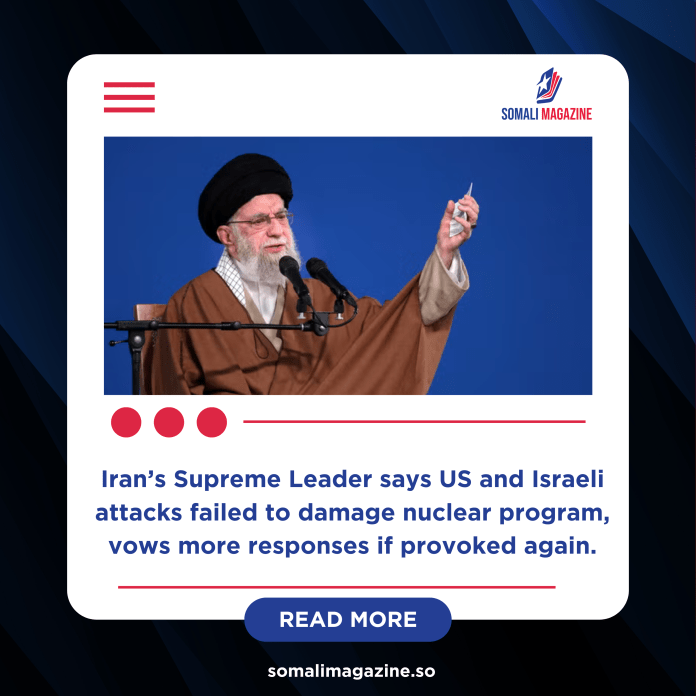Facebook Twitter (X) Instagram Somali Magazine - People's Magazine
Iran’s Supreme Leader, Ayatollah Ali Khamenei, has downplayed recent US and Israeli airstrikes on Iran’s nuclear facilities, saying they failed to achieve anything significant. This was his first public statement since a ceasefire between Iran and Israel was announced on Tuesday.
In a televised speech on Thursday, Khamenei said the attacks “did not accomplish anything” and did not damage Iran’s nuclear program in any meaningful way. He also claimed that Iran’s retaliation — a missile strike on a US air base in Qatar — delivered a “heavy blow” and served as a warning for future confrontations.
His comments came in response to US officials who claimed the strikes had caused serious damage. US Defence Secretary Pete Hegseth said intelligence showed Iran’s nuclear program was “set back by years.” He described the strikes as a “historic success,” claiming they had rendered Iran’s uranium enrichment sites “inoperable.”
President Donald Trump had also declared that the strikes had “totally obliterated” three key nuclear sites. However, he angrily denied reports from unnamed officials suggesting the damage may have been less extensive.
During a Pentagon briefing, Hegseth emphasized that the US had no evidence that Iran managed to move enriched uranium out of Fordo — one of the most secure underground nuclear facilities — before the strikes. The site was reportedly hit with powerful “bunker buster” bombs.
Khamenei, who had not been seen publicly since the conflict with Israel began on June 13, appeared on state TV from an undisclosed location. Iranian officials said he was in a safe place, but no exact location was given, fueling speculation about his whereabouts.
In his speech, Khamenei warned that if Iran is attacked again, it will respond with more strikes on US bases in the region. He claimed that Iran had already proven its strength and declared victory over both the US and Israel.
“Trump exaggerated the impact of the strikes,” Khamenei said. “They couldn’t accomplish anything and did not achieve their objective.”
Referring to Iran’s missile strike on the US base in Qatar — which caused no casualties or damage — Khamenei added: “This kind of response can be repeated in the future. If there is another attack, the cost for the enemy will be very high.”
Meanwhile, reports suggest the US is exploring ways to bring Iran back to the negotiating table. CBS News reported that the White House is considering offering support for a civilian nuclear program that does not include uranium enrichment. However, Iran’s foreign minister said there are no plans for talks with the US at this time.
The recent escalation between Iran and Israel began on June 13, after Israeli Prime Minister Benjamin Netanyahu warned that Iran was close to building a nuclear weapon. One day earlier, the global nuclear watchdog, the IAEA, formally declared that Iran was in violation of its nuclear commitments — the first such accusation in 20 years.
Iran has consistently insisted that its nuclear program is for peaceful, civilian purposes and that it has never sought to build nuclear weapons.
In response to the recent conflict and pressure, Iran’s parliament has approved a new bill calling for the country to end its cooperation with the IAEA. This move would significantly limit international monitoring of Iran’s nuclear activities.

